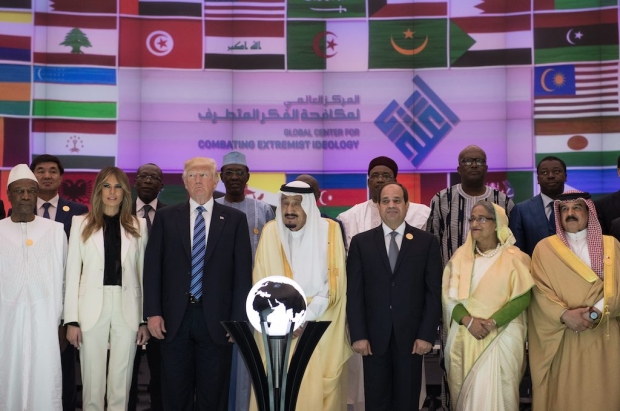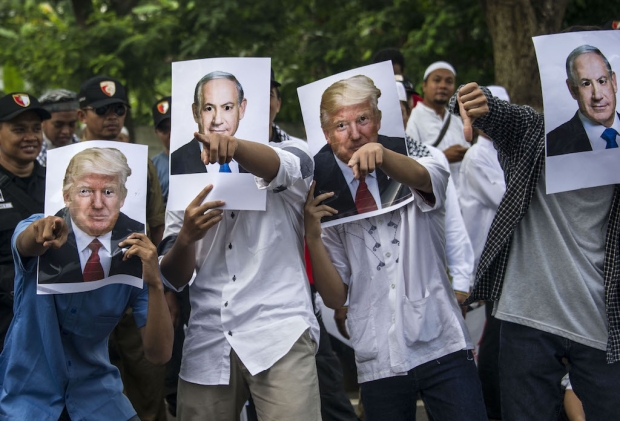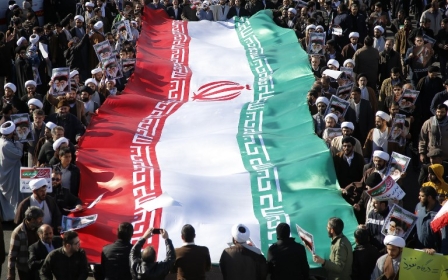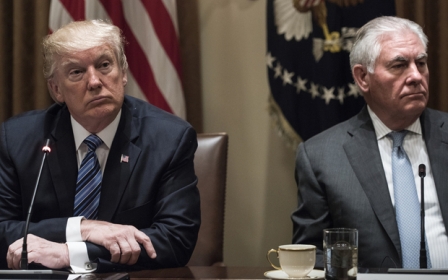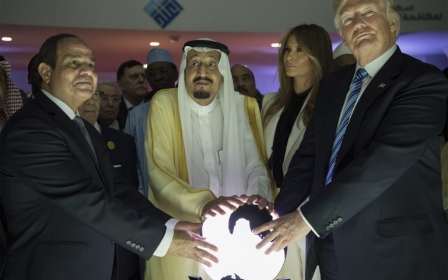A 'stable genius' or white trash in the White House?

One of the delights of reading Michael Wolff’s account of life in the White House is to picture the US president doing the same.
You can see him wearing his golf face, stomping up and down the cramped presidential lodgings, screaming down his mobile phone. As he does so, his signature comb-over starts to unravel, revealing his bald pate.
Who persuaded him to allow that Judas Wolff - a "semi-permanent seat on a couch in the West Wing" - 200 interviews? Where are the transcripts? He wants all of them on his desk by the morning.
How many other "seething, self-pitying and unsolicited phone calls" must he now be making?
On Saturday, he took to Twitter to defend himself against accusations that he was mentally unstable, reassuring his followers that he was in fact a "very stable genius". This in turn kicked off a whole debate about the president's mental fitness for office and the possibility of removing him using the 25th Amendment.
The light that Wolff sheds on the occupant of the White House is stark and unforgiving.
Shocked and awed by the success of his own campaign, in which he was reluctant to invest his own money, Trump has never come to terms with what being a president of the United States means. He does not listen, and when he does he acts on the advice of the last person to corner him.
He is incapable of judgment. He is obsessed by the media and a slave to it.
Ivanka his daughter had long ago figured out how to make successful presentations to her father.
She told her protege Dina Powell, as related by Wolff: "You had to push his enthusiasm buttons. He may be a businessman, but numbers didn't do it for him. He was not a spreadsheet jockey - his numbers guys dealt with spreadsheets. He liked big names. He liked the big picture - he liked literal big pictures. He liked to see it. He liked 'impact'."
Trump became bored, listless and irritable with small stuff - such as detail, process or indeed informing himself as to what was actually going on.
What he needed was something big, a demand particularly unsuited to the volatile and vulnerable state of the world.
"Big things, we need big things," he said, angrily and often. "This isn't big. I need big. Bring me big. Do you even know what big is?"
The gut instinct of foreign leaders who depend on their military or economic ties to the US will be to put as much distance between themselves and this self-immolating man in the White House as possible
This was how Trump's restless but truly empty mind alighted on the Middle East.
"He had no patience with the our-hands-are-tied ennui of the post-cold war order, that sense of the chess board locked in place, of incremental movement being the best-case scenario - the alternative being only war. His was a much simpler view: Who’s got the power? Give me his number."
And, just as basically: "The enemy of my enemy is my friend. If Trump had one fixed point of reference in the Middle East, it was - mostly courtesy of [now former national security advisor] Michael Flynn's tutoring - that Iran was the bad guy. Hence everybody opposed to Iran was a pretty good guy."
But it was also how the Middle East settled on Trump.
'A curious alignment'
Crown Prince Mohammed bin Salman (MbS), for one, appreciated the fact that Trump's son-in-law Jared Kushner had not earned his position as the administration's Middle East envoy by virtue of anything he had personally achieved, but solely by the fact that he was a family member. This comforts a member of the Saudi royal family, because this is exactly how things are done at home.
Wolff observes "a curious alignment" between Trump and MbS in that neither had any education outside their respective countries.
"Knowing little made them oddly comfortable with each other. When MBS offered himself to Kushner as his guy in the Saudi kingdom, that was 'like meeting someone nice at your first day of boarding school,' said Kushner’s friend."
The Riyadh trip in May 2017 was big. The Saudis would immediately buy $110bn of US arms and a total of $350bn over 10 years. The Saudis threw a $75m party, seated Trump on a throne, and ferried the first family around in gold golf carts.
Trump called home to tell his friends how easy this foreign relations thing was and how Obama had messed it all up. Before the trip he had nothing but praise for his son-in-law.
"Jared's gotten the Arabs totally on our side. Done deal," he assured one of his after-dinner callers before leaving on the trip. "It's going to be beautiful."
"He believed," said the caller, "that this trip could pull it out, like a twist in a bad movie."
So much for the fun. Now for the horror.
Even if they discount 20 percent of Wolff's account as Bannon sourced or exaggerated for effect, the remaining 80 per cent is simply too damning. Imagine the blood draining from the faces of America's allies as they read how dysfunctional the man running the White House is. The gut instinct of foreign leaders who depend on their military or economic ties to the US will be to put as much distance as possible between themselves and this self-immolating man, this loser in the White House .
[Trump's] logic is rather like saying that because the last three bomb disposal teams have failed to defuse that 500 pound bomb workmen uncovered in your basement, why not try it cutting it open yourself with that angle-grinder you got for Christmas?
Anyone who has not already bailed out of this nosediving presidency is probably already politically dead and that includes Trump, Kushner, Ivanka, and Ambassador to the UN Nikki Haley. Those who have jumped from the crashing plane, like former chief strategist Steve Bannon, are probably also finished.
The same toxic effect that President Trump is having on the occupancy rates of his hotel chain will also soon be felt by US allies. Soon, it will be not such a good idea to share a public platform with him. Theresa May will be in no hurry to make Trump’s visit to the UK, as head of state, happen.
Trump's big idea of a Middle East breakthrough is finished before it even started. His administration is going to wreak its revenge on Palestinian President Mahmoud Abbas, the one and only interlocutor he could have had for it, for having led the recent UN vote against Trump's announcement that he is moving his embassy to Jerusalem.
Defunding UNWRA, the UN agency that provides schools and relief to Palestinians, is only the start of it.
A wrecker
Trump's rage is as damaging as his enthusiasm was, because, as Wolff more or less constantly notes, Trump's structural handicap as president is his inability to marry cause and effect.
Even Benjamin Netanyahu, the Israeli leader who has most to gain from Trump and is using the policy vacuum created by Trump to annex the settlements around Jerusalem, must be having second thoughts about the damage Trump can do him.
The state of Israel cannot quietly but persistently push its borders further and further into the West Bank if the financial rug is pulled from under the feet of the Palestinian Authority, a body which above any other has helped Israel achieve its cheapest period of occupation. Under the PA, the Palestinians occupy themselves.
For decades, Israel's policy was predicated on keeping the Palestinians "on a diet," as one former prime ministerial aide so delicately put it, in the various enclosures it had constructed for them.
This meant balancing overt oppression with measures of life support. Israel turned migrant Palestinian labour on its building sites on and off like a tap. The last thing it needs for the continued expansion of Israel is for the Palestinian economy and social system to collapse altogether, which is where Trump's rage at the UN reaction to the Jerusalem embassy move is leading him.
Similarly, European powers who helped to negotiate the nuclear deal with Iran must be having grave thoughts about the capacity of Trump to wreck what few foreign policy achievements have been made by previous US administrations.
Trump is a wrecker, in command of a very large wrecking ball. America cannot be isolated or put under sanctions. Its economy is too large for that, and the world is too dependent on it.
There is of course a positive side to Trumpism.
In one respect Trump is right. The last three administrations, and many more before them, had gotten the Middle East wrong.
But his logic is rather like saying that because the last three bomb disposal teams have failed to defuse that 500 pound bomb workmen uncovered in your basement, why not try cutting it open yourself with that angle-grinder you got for Christmas?
So apart from destroying himself, which I am convinced is what he is doing, Trump is capable of bringing down with him much else. His Arab allies in Saudi, Egypt, the Emirates for one, the international consensus on Israel for another. The status quo is to shield Israel from any attempt to isolate it internationally. Trump could expose Israel to the need for international sanctions like no other president before him.
Trump is also recreating a real US left, for which he deserves our undying gratitude. Neoliberalism at home and neoconservatism abroad had cross-party support. What Bush continued in Iraq, Clinton started in post-Soviet Russia. That era is well and truly over.
This does not mean that Trump cannot start a war. The way he was persuaded to bomb Syria, by his daughter showing him pictures of gassed Syrian children, is telling. The president is not weighing arguments but images. But it means he cannot win one.
When in the future we chronicle this unstable start to a new century, Wolff’s shrewd portrait will form another potential exhibit in a growing gallery of evidence. The front cover could well see its way to a future exhibition mounted by the Smithsonian Museum of American History in Washington, entitled: "End of Empire".
Empires collapse when they become too costly and too much of a political burden for their elites to govern. This is happening now in Washington. Yes, this is a president fundamentally unfit for office, but it is also true that Trump is himself a product of failure, and that failure belongs collectively to more than one president and administration.
In this sense, that ball of fire and fury that is Trump is doing the world a favour. It is forcing it to rethink the world order without the United States. That has to happen before anything changes.
- David Hearst is editor-in-chief of Middle East Eye. He was chief foreign leader writer of The Guardian, former Associate Foreign Editor, European Editor, Moscow Bureau Chief, European Correspondent, and Ireland Correspondent. He joined The Guardian from The Scotsman, where he was education correspondent.
The views expressed in this article belong to the author and do not necessarily reflect the editorial policy of Middle East Eye.
Photo: US President Donald Trump walks to Marine One prior to departing from the South Lawn of the White House in Washington, DC, January 5, 2018, as he travels for a weekend with Republican lawmakers at Camp David in Maryland (AFP).
This article is available in French on Middle East Eye French edition.
Middle East Eye propose une couverture et une analyse indépendantes et incomparables du Moyen-Orient, de l’Afrique du Nord et d’autres régions du monde. Pour en savoir plus sur la reprise de ce contenu et les frais qui s’appliquent, veuillez remplir ce formulaire [en anglais]. Pour en savoir plus sur MEE, cliquez ici [en anglais].



